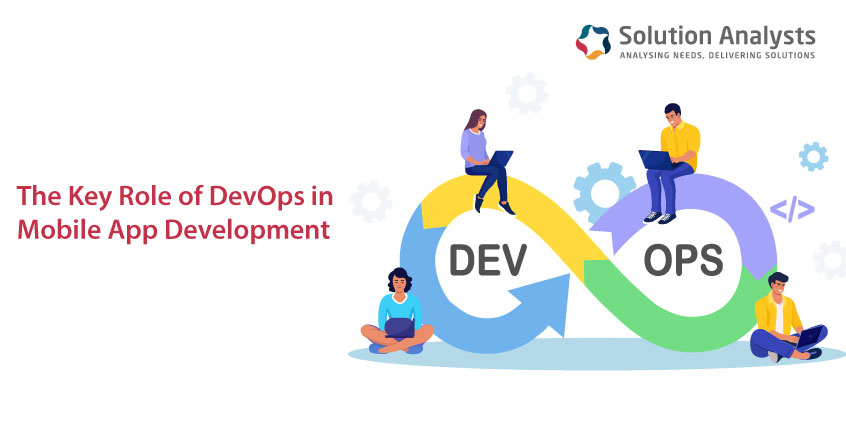
Table of Contents
In modern times DevOps in mobile app development plays a key role as it enables continuous application delivery from conception to production. DevOps has the potential to overcome the barriers to development operations. Overall, DevOps is a shift from the traditional method to agile software development. The resulting continuous delivery by DevOps helps enterprises to reduce the time to market for new features while also grabbing more market possibilities.
The reason behind imbibing the concept of DevOps for mobile app development is to support a culture of cooperation between teams, which earlier used to work individually. DevOps transformation is known to bring automation, constant delivery, and agility, making the development teams more productive so that they launch software more reliably and quickly.
With the adoption of DevOps, it has become easier to fulfill business objectives and deliver greater value to clients. DevOps is a beneficial step for enterprises as it has the potential to bring high ROI.
According to Markets and Markets, the DevOps market size is expected to grow up to USD 10.31 billion in 2023, at a CAGR of 24.7%.

Importance of DevOps in Mobile App Development
For a mobile app development company, DevOps is extremely useful. However it may come across as a complex procedure, but it can be effective, productive, revenue-generating, and gives a positive customer experience.
The key principle of DevOps is continuous delivery. It refers to deploying the software (in this case, a mobile app) and the environment in which it runs automatically and on-demand in various stages of the mobile app development cycle. Hence, hiring a DevOps development company is an opportunity to gain efficient and faster mobile application development processes.
Moreover, aligning mobile DevOps processes, practices, and tools enables organizations to effectively overcome the following bottlenecks and inefficiencies.
- Inconsistent Development Environment
- Human Errors
- Manual Testing Process
- Lack of Ownership
6 Parts of the DevOps Approach
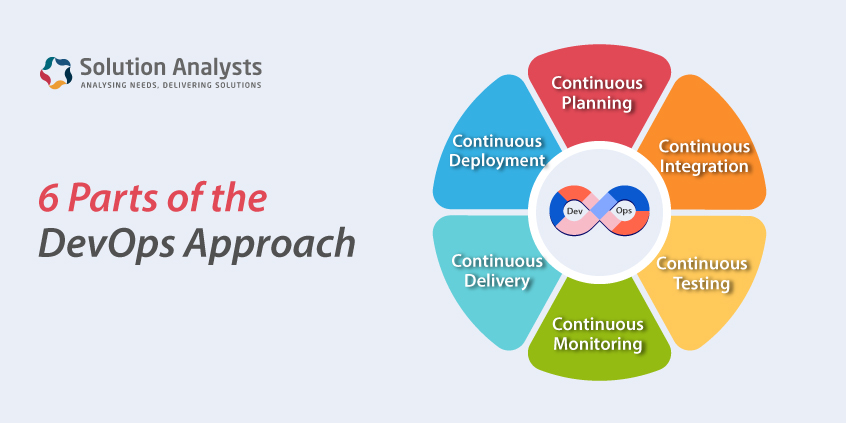
-
Continuous Planning
It brings the entire project team together on a single platform to identify the scope of the application and assess possible results and resources.
-
Continuous Integration
It prioritizes frequent error-free builds and ensures seamless integration with the most recently developed code.
-
Continuous Testing
It allows early detection of bugs at the initial stage. It ensures the application’s and infrastructure’s performance and reliability as the process transitions from development to production.
-
Continuous Monitoring
It facilitates the identification and solutions of issues. It ensures the app’s stability and smooth functioning.
-
Continuous Delivery
It allows the delivery of software/updates to the production environment in smaller batches which results in a faster release.
-
Continuous Deployment
In this phase, any code that passes the automated testing is automatically released to production.
How to Implement DevOps in Mobile Development
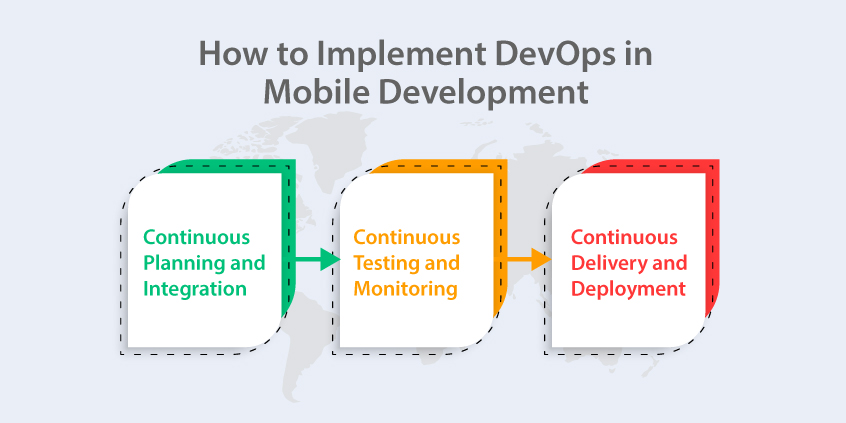
Successful adoption of DevOps-based mobile app development solutions
is implemented in three fundamental steps as discussed below:
-
Continuous Planning and Integration
Continuous planning involves the collaboration of the mobile app project team which includes developers, operations staff, the project manager, and other crucial stakeholders. The entire team concludes the scope of work for mobile application development.
Continuous integration ensures that the code developed by one developer should smoothly integrates with the code written by another developer. In other words, it requires frequent builds, which must be integrated with recently developed code.
There is also a continuous submission of apps in the play store and the apple store. This can be done with the DevOps integration in the mobile development
-
Continuous Testing and Monitoring
A typical setup of mobile app testing is within simulators and emulators instead of the real environment. But organizations need to realize that a mobile app can perform efficiently in a test environment and may fail in a real environment.
Hence, it is important to perform automated tests that can improve the process of tackling regular builds, bug identification, and error rectification. Moreover, ensure continuous performance monitoring by executing third-party SDKs to identify the cause of failure.
-
Continuous Delivery and Deployment
Continuous delivery involves the deployment of the code in a production environment by complying with each fix or change to the production-like environment.
Continuous deployment is the last step in DevOps cycles. In this step, code is automatically deployed in the production environment after approval by continuous testing. Hence, this phase is one of the key aspect of DevOps Enterprise.
Major Benefits of DevOps for Mobile App Development
Mobile app development services must provide the right application to customers at right time for ensuring user loyalty. Offering quality software to the users and knowing their overall experience is important as it gives an idea to the service providers about the market demand.
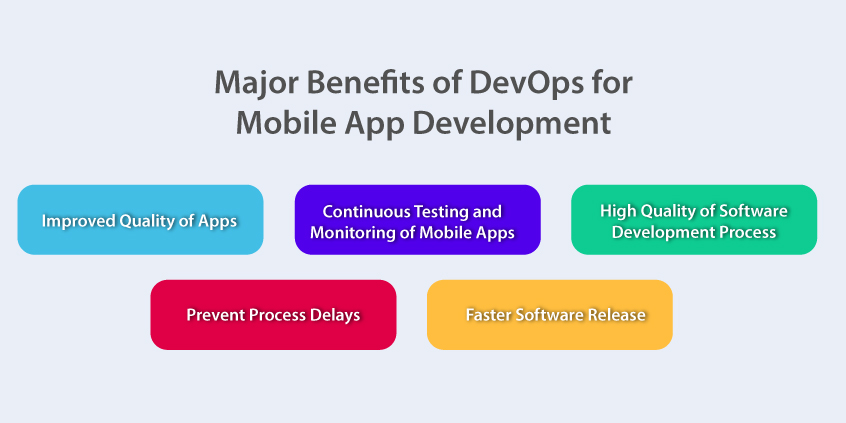
Hence, a developer surely needs DevOps to keep up with market trends and the demands of software. The “continuous everything” culture of DevOps offers a wide variety of advantages as mentioned further.
-
Improved Quality of Apps
DevOps helps in developing apps that provide a better user experience as it is one of the core factors behind the accomplishment of any business. DevOps enables immediate reporting and feedback, clear development procedure, and regression testing which are helpful in gaining quicker solutions, removing errors, and improving UX optimization.
-
Continuous Testing and Monitoring of Mobile Apps
As there is a wide variety of OS versions available currently, manual testing of all is not possible. However, maximum testing is done on simulators instead of gadgets. The reality is that a mobile app may work properly in a manual testing period, but it may fail to perform in a live environment.
The factors responsible for such performance may be power, network conditions, memory, etc. Therefore, both enterprises and developers should monitor continuously through third-party SDKs which come in the form of crash reports, log reports, and many more to overcome the poor performance of apps.
-
High Quality of Software Development Process
Owing to the continuous monitoring aspect, DevOps maintains the quality of the app development process. Monitoring every part of code from start to delivery while reviewing in between leads to high-quality results. As per the feedback on app performance, the solving of bugs and updates for future changes and improvements are implemented.
DevOps enhances the software development process by taking care of every aspect and considering the entire structure. As a result, enterprises can control the quality of software building, with monitoring and cooperation, and achieve an efficiently performing app.
-
Prevent Process Delays
DevOps culture can save time by enhancing communication between team members. Thus, businesses can maintain transparency in the entire software development process.
With DevOps, various kinds of process delays can be prevented
- Unclear Communication
- Workflow Inconsistency
- Manual Testing
- Lack of ownership
- Unstable Development Process
-
Faster Software Release
As DevOps enhances the cooperation between team members and departments, it saves substantial time on the app development process. Transparency in communication leads to faster data exchange and quicker release time.
Hence, the use of DevOps is extremely beneficial for improving the software development process and accomplishing your business goals.
Ending Note
We can conclude that DevOps in mobile app development plays an important role and the end result is the creation of better mobile applications. DevOps encourages the seamless operation of your mobile app. Therefore, DevOps is highly required for effective mobile app development and efficient functionality of the app.
Solution Analysts is a leading DevOps service provider that strives to deliver state-of-the-art DevOps services & solutions to businesses for automating and streamlining processes in a cross-functional environment. Our goal is to help enterprises to cater to emerging market needs more rapidly and efficiently.







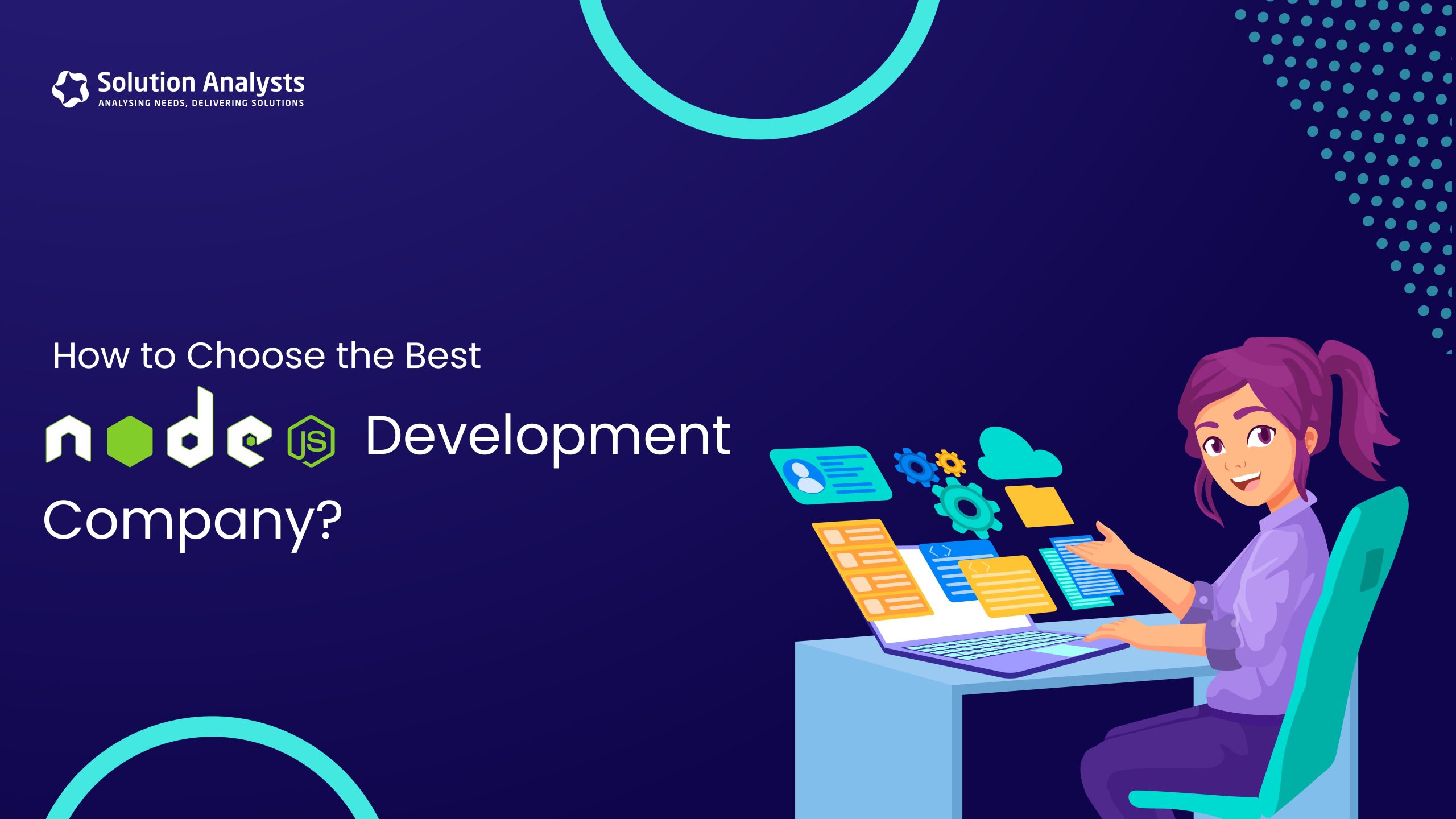



 sales@solutionanalysts.com
sales@solutionanalysts.com biz.solutionanalysts
biz.solutionanalysts






